Merken magazine
The Politics behind a Shared Meal: The Example of NBTA House
How can a shared meal become a political act? Discover how cuisine, restaurants, and shared dining experiences can shape life. NBTA House stands as a quiet yet powerful example of how food can reshape culture and responsibility.
11/21/2025
What if politics weren’t something that only happened in parliaments or protests, but also in the quiet choices of our daily lives, as close to us as how we eat, share, and move through the world? Our routines, appearing so ordinary on the surface, can be deeply shaped by the capitalistic systems we live in. What we buy, how we cook, and the pace at which we live are all guided by a logic centred on market and profit, disregarding the harm it has on nature, animals, and ourselves.
If that’s the case, then perhaps daily life is not neutral at all. It becomes a space where the values and priorities of these systems are reproduced, but also, under the light of hope, where they can be reimagined. A morning meal, a conversation, or a way of gathering is so powerful and can hold a possibility of resisting through small acts that quietly question the system in which they exist.
NBTA House, a vegetarian restaurant and communal space in Tangier, works within this very idea. By rethinking cuisine, reimagining how people come together, and embracing slower, more intentional ways of making and sharing, it reminds us that change can begin with something as simple and as political as a meal on a plate.
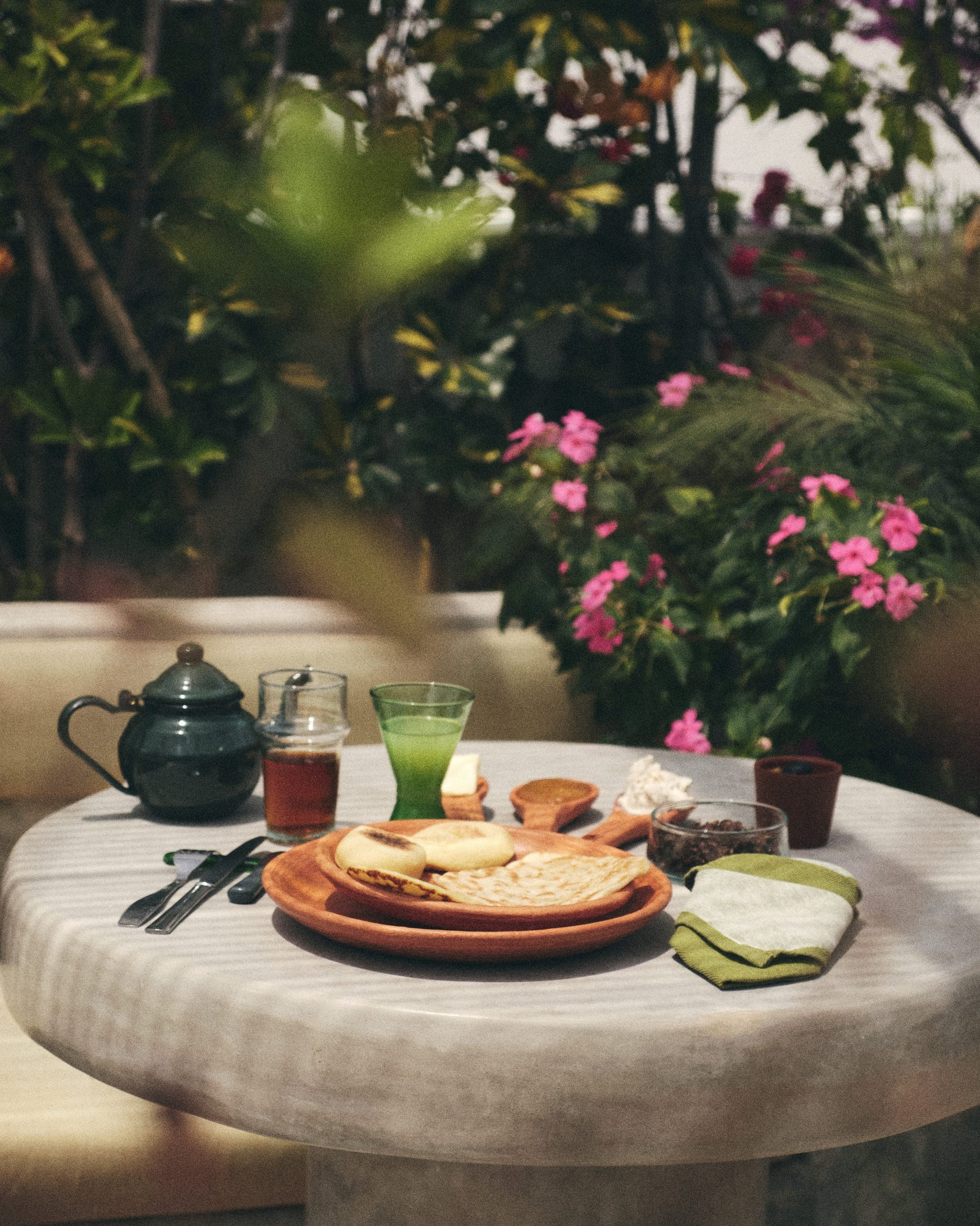

Credits: Images © NBTA.
Table of Content
Resisting With a Fork: Cuisine as a form of Anti-Capitalist and Non-Harmful Living
Restaurants’ Low-Impact Practices
Vegetarian Cuisine
Local Sourcing
Waste as a Resource
Every Drop Matters: The Discipline of Water
Resisting With a Fork: Cuisine as a form of Anti-Capitalist and Non-Harmful Living
Food is never just food. It carries stories of how it was grown, what hands (or machines) laboured for it, and what systems made it possible. The production and consumption industry is, unfortunately, a high-carbon footprint one that prioritises quick, fast food and profit abundance at the cost of animals, ecosystems, and the climate itself.
Luckily, cuisine can be used as a culinary revolution to reject these speedy ways of consumption. There are many ways and practices that this could be manifested, and NBTA House serves as one example. A sustainable approach to food is one that listens and responds to the world we live in, one that longs for awareness, care, and responsibility. Eating consciously isn’t just about getting your greens anymore, it’s about reducing environmental impact, supporting local hands, and choosing practices rooted in respect for the planet. Through this, the kitchen could work as a quiet form of resistance that shows how intentional rather than exploitative meals can be. With sourcing ingredients from nearby farmers and markets, local economies get stronger and the pollution that comes from long-distance transportation weaker. A plant-based menu reduces harm to animals and the planet, offering nourishment rooted in thoughtfulness and care. Seasonal cooking follows the rhythm of the earth, and local sourcing ensures freshness and trust.
This approach is not symbolic; it has tangible effects. Studies, including one published in Nature Food (Stylianou et al., 2021), show that simply shifting from an omnivore diet to a plant-based one is one of the most effective ways to reduce deforestation, land use, freshwater consumption, eutrophication, and biodiversity loss.
Resisting With a Fork: Cuisine as a form of Anti-Capitalist and Non-Harmful Living
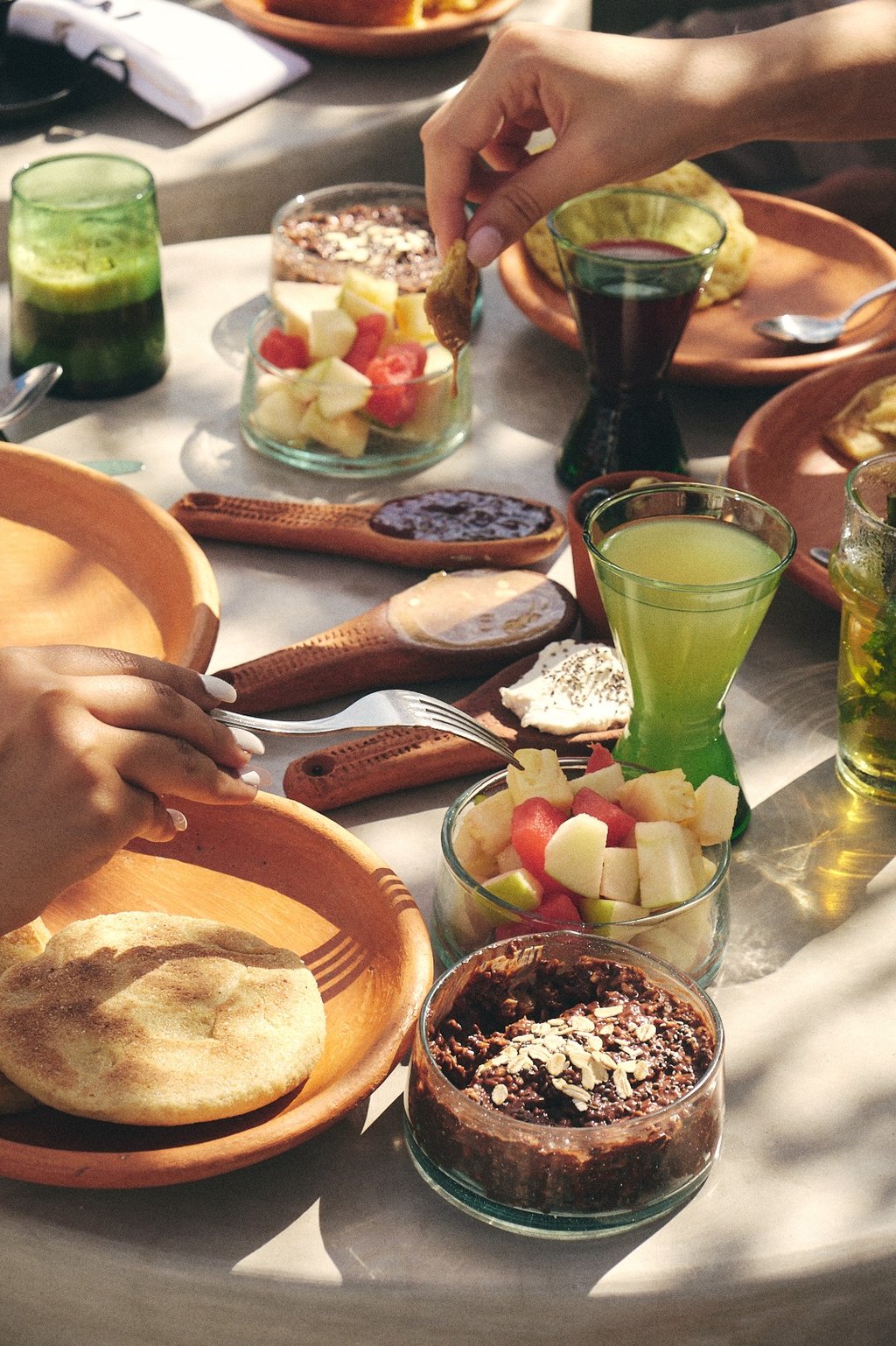

Luckily, cuisine can be used as a culinary revolution to reject these speedy ways of consumption. There are many ways and practices that this could be manifested, and NBTA House serves as one example. A sustainable approach to food is one that listens and responds to the world we live in, one that longs for awareness, care, and responsibility. Eating consciously isn’t just about getting your greens anymore, it’s about reducing environmental impact, supporting local hands, and choosing practices rooted in respect for the planet. Through this, the kitchen could work as a quiet form of resistance that shows how intentional rather than exploitative meals can be. With sourcing ingredients from nearby farmers and markets, local economies get stronger and the pollution that comes from long-distance transportation weaker. A plant-based menu reduces harm to animals and the planet, offering nourishment rooted in thoughtfulness and care. Seasonal cooking follows the rhythm of the earth, and local sourcing ensures freshness and trust.
This approach is not symbolic; it has tangible effects. Studies, including one published in Nature Food (Stylianou et al., 2021), show that simply shifting from an omnivore diet to a plant-based one is one of the most effective ways to reduce deforestation, land use, freshwater consumption, eutrophication, and biodiversity loss.
Food is never just food. It carries stories of how it was grown, what hands (or machines) laboured for it, and what systems made it possible. The production and consumption industry is, unfortunately, a high-carbon footprint one that prioritises quick, fast food and profit abundance at the cost of animals, ecosystems, and the climate itself.
Restaurants’ Low-Impact Practices
To understand how food impacts the planet, we must examine its entire journey, from production to storage and transportation. Each stage leaves a trace, and NBTA responds to this by grounding its work in conscious, low-impact practices that honour both the people and the place.
Vegetarian Cuisine
NBTA relies on an entirely vegetarian cuisine, mixing sustainability in its hospitality practice. Throughout history, meatless diets have long been promoted by ethical and religious values, and as noted in research published in The American Journal of Medicine (Ajala et al., 2023), scientific evidence supporting these diets is actually quite recent, emerging primarily in the last 150 years. The studies show that relying on plant-based diets, like NBTA’s choice, lowers environmental footprint, reduces emissions, and most importantly, shows that eating can be rich, culturally meaningful, and ecologically responsible.
Local sourcing
Local sourcing is a tradition in Moroccan swiqa shopping; it reduces transportation and the pollution that comes with it, lowers waste by minimising packaging, all the while supporting local economies and small businesses. By this, NBTA shrinks its carbon footprint and makes food centred around the community, allowing them to manage their waste and reduce pollution.
Waste as a Resource
Waste can be handled more creatively in the gastronomy industry, especially when it uses vegetarian ingredients. Vegetable trimmings and scraps can be turned into flavourful stocks, leftovers can be used in compost, and single-use plastic can be replaced by recyclable and natural materials. These simple acts have immense effects on the environment as well as f inancial costs
Every Drop Matters: The Discipline of Water
Water is the most precious ingredient; it is quintessential in cooking, cleaning, and gardening. In general, conserving water is important, but it becomes critical in communal spaces like restaurants and hotels because of the constant demand, high volume of usage, and the collective responsibility to protect shared resources. Thousands of litres can be saved through practical, efficient dishwashing, low-flow faucets, and water-recycling systems. Similar to waste management, eco-friendly use of water contributes to both the environment, as it responsibly uses an important element of nature, and the economy by reducing the water bill costs.
Restaurants’ Low-Impact Practices
To understand how food impacts the planet, we must examine its entire journey, from production to storage and transportation. Each stage leaves a trace, and NBTA responds to this by grounding its work in conscious, low-impact practices that honour both the people and the place.
Vegetarian Cuisine
NBTA relies on an entirely vegetarian cuisine, mixing sustainability in its hospitality practice. Throughout history, meatless diets have long been promoted by ethical and religious values, and as noted in research published in The American Journal of Medicine (Ajala et al., 2023), scientific evidence supporting these diets is actually quite recent, emerging primarily in the last 150 years. The studies show that relying on plant-based diets, like NBTA’s choice, lowers environmental footprint, reduces emissions, and most importantly, shows that eating can be rich, culturally meaningful, and ecologically responsible.
Local sourcing
Local sourcing is a tradition in Moroccan swiqa shopping; it reduces transportation and the pollution that comes with it, lowers waste by minimising packaging, all the while supporting local economies and small businesses. By this, NBTA shrinks its carbon footprint and makes food centred around the community, allowing them to manage their waste and reduce pollution.
Waste as a Resource
Waste can be handled more creatively in the gastronomy industry, especially when it uses vegetarian ingredients. Vegetable trimmings and scraps can be turned into flavourful stocks, leftovers can be used in compost, and single-use plastic can be replaced by recyclable and natural materials. These simple acts have immense effects on the environment as well as financial costs
Every Drop Matters: The Discipline of Water
Water is the most precious ingredient; it is quintessential in cooking, cleaning, and gardening. In general, conserving water is important, but it becomes critical in communal spaces like restaurants and hotels because of the constant demand, high volume of usage, and the collective responsibility to protect shared resources. Thousands of litres can be saved through practical, efficient dishwashing, low-flow faucets, and water-recycling systems. Similar to waste management, eco-friendly use of water contributes to both the environment, as it responsibly uses an important element of nature, and the economy by reducing the water bill costs.


Vegetarian Cuisine
NBTA relies on an entirely vegetarian cuisine, mixing sustainability in its hospitality practice. Throughout history, meatless diets have long been promoted by ethical and religious values, and as noted in research published in The American Journal of Medicine (Ajala et al., 2023), scientific evidence supporting these diets is actually quite recent, emerging primarily in the last 150 years. The studies show that relying on plant-based diets, like NBTA’s choice, lowers environmental footprint, reduces emissions, and most importantly, shows that eating can be rich, culturally meaningful, and ecologically responsible.
Local sourcing
Local sourcing is a tradition in Moroccan swiqa shopping; it reduces transportation and the pollution that comes with it, lowers waste by minimising packaging, all the while supporting local economies and small businesses. By this, NBTA shrinks its carbon footprint and makes food centred around the community, allowing them to manage their waste and reduce pollution.
Waste as a Resource
Waste can be handled more creatively in the gastronomy industry, especially when it uses vegetarian ingredients. Vegetable trimmings and scraps can be turned into flavourful stocks, leftovers can be used in compost, and single-use plastic can be replaced by recyclable and natural materials. These simple acts have immense effects on the environment as well as financial costs.
Every Drop Matters: The Discipline of Water
Water is the most precious ingredient; it is quintessential in cooking, cleaning, and gardening. In general, conserving water is important, but it becomes critical in communal spaces like restaurants and hotels because of the constant demand, high volume of usage, and the collective responsibility to protect shared resources. Thousands of litres can be saved through practical, efficient dishwashing, low-flow faucets, and water-recycling systems. Similar to waste management, eco-friendly use of water contributes to both the environment, as it responsibly uses an important element of nature, and the economy by reducing the water bill costs.
Restaurants’ Low-Impact Practices
To understand how food impacts the planet, we must examine its entire journey, from production to storage and transportation. Each stage leaves a trace, and NBTA responds to this by grounding its work in conscious, low-impact practices that honour both the people and the place.
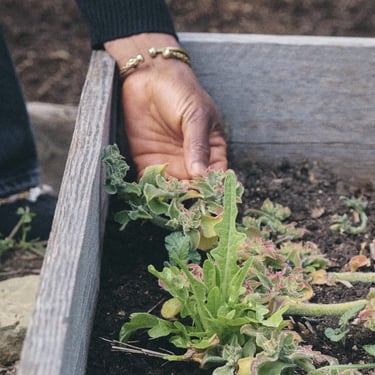

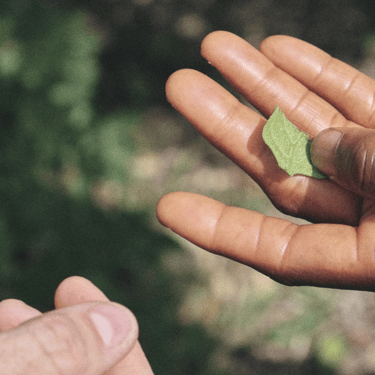

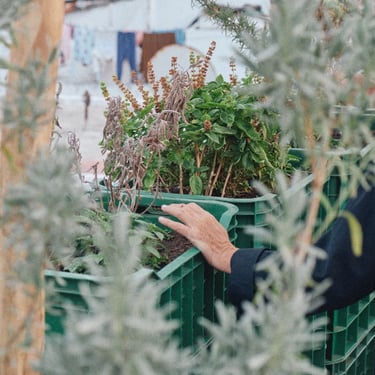

To understand how food impacts the planet, we must examine its entire journey, from production to storage and transportation. Each stage leaves a trace, and NBTA responds to this by grounding its work in conscious, low-impact practices that honour both the people and the place.
Vegetarian Cuisine
NBTA relies on an entirely vegetarian cuisine, mixing sustainability in its hospitality practice. Throughout history, meatless diets have long been promoted by ethical and religious values, and as noted in research published in The American Journal of Medicine (Ajala et al., 2023), scientific evidence supporting these diets is actually quite recent, emerging primarily in the last 150 years. The studies show that relying on plant-based diets, like NBTA’s choice, lowers environmental footprint, reduces emissions, and most importantly, shows that eating can be rich, culturally meaningful, and ecologically responsible.
Local sourcing
Local sourcing is a tradition in Moroccan swiqa shopping; it reduces transportation and the pollution that comes with it, lowers waste by minimising packaging, all the while supporting local economies and small businesses. By this, NBTA shrinks its carbon footprint and makes food centred around the community, allowing them to manage their waste and reduce pollution.
Waste as a Resource
Waste can be handled more creatively in the gastronomy industry, especially when it uses vegetarian ingredients. Vegetable trimmings and scraps can be turned into flavourful stocks, leftovers can be used in compost, and single-use plastic can be replaced by recyclable and natural materials. These simple acts have immense effects on the environment as well as financial costs
Every Drop Matters: The Discipline of Water
Water is the most precious ingredient; it is quintessential in cooking, cleaning, and gardening. In general, conserving water is important, but it becomes critical in communal spaces like restaurants and hotels because of the constant demand, high volume of usage, and the collective responsibility to protect shared resources. Thousands of litres can be saved through practical, efficient dishwashing, low-flow faucets, and water-recycling systems. Similar to waste management, eco-friendly use of water contributes to both the environment, as it responsibly uses an important element of nature, and the economy by reducing the water bill costs.


Restaurants’ Low-Impact Practices
Sustainability, Culture, and Community
Sustainability is a cultural experience shaped by the community and a sense of support. Living in a sustainable world is a human social experience where everyone does what’s good for not only themselves and others, but also for those to will live after us on this planet.
In this regard, NBTA House enriches this social sense through its communal space that welcomes artists, guests, and community members into its Riad. Beautifully designed, it guides its visitors to connect over the interactive dance of arts, food, and the larger ecological reality, enticing guests to sit, taste, and talk, carrying further the Moroccan traditional values of collective nourishment and sharing. A broader understanding of how our world functions politically, combined with a commitment to ethical consumption expressed through concrete action, reveals how culture, politics, and the practices of consuming and gathering intersect. Each meal becomes an act of consciousness and intention, shaped by the imagination of a better future.
In a world where we distance environmental issues from our daily lives, using a cultural space to bring ecological awareness back enriches our collective spirit, enthusiasm, unity, and purpose. This bond of community and nature is deepened at NBTAhouse through workshops, music events, and exhibitions, all centred around sustainability and the environment.
Sustainability, Culture, and Community
Sustainability is a cultural experience shaped by the community and a sense of support. Living in a sustainable world is a human social experience where everyone does what’s good for not only themselves and others, but also for those to will live after us on this planet.
In this regard, NBTA House enriches this social sense through its communal space that welcomes artists, guests, and community members into its Riad. Beautifully designed, it guides its visitors to connect over the interactive dance of arts, food, and the larger ecological reality, enticing guests to sit, taste, and talk, carrying further the Moroccan traditional values of collective nourishment and sharing. A broader understanding of how our world functions politically, combined with a commitment to ethical consumption expressed through concrete action, reveals how culture, politics, and the practices of consuming and gathering intersect. Each meal becomes an act of consciousness and intention, shaped by the imagination of a better future.
In a world where we distance environmental issues from our daily lives, using a cultural space to bring ecological awareness back enriches our collective spirit, enthusiasm, unity, and purpose. This bond of community and nature is deepened at NBTAhouse through workshops, music events, and exhibitions, all centred around sustainability and the environment.
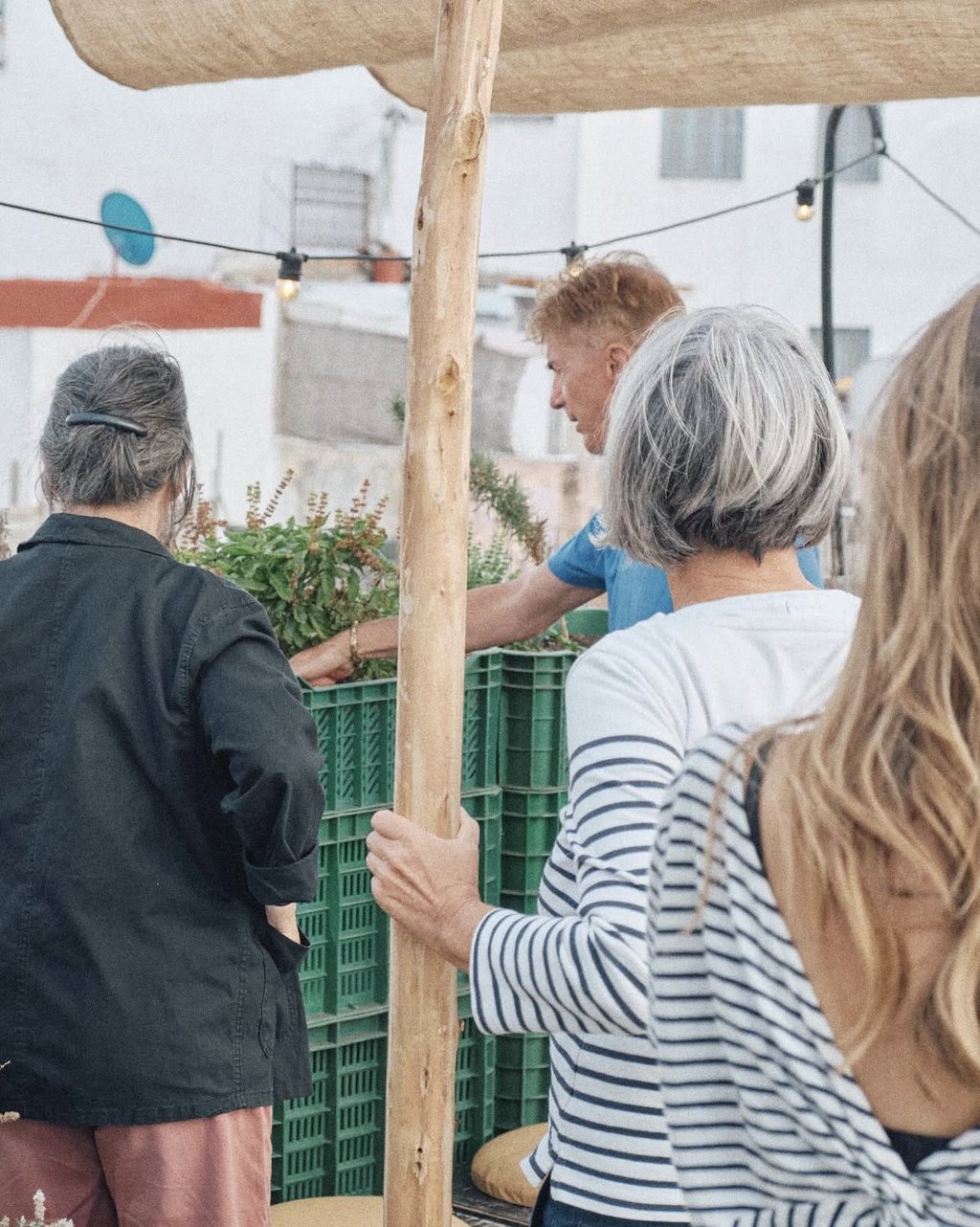

About Nbta
NBTA is Tangier’s first fully vegetarian guesthouse, where Moroccan classics are reimagined with care, seasonality, and local ingredients. The kitchen follows the rhythm of the land and brings plant-based tradition back to the table.
Every detail, from terracotta, to handwoven baskets, to glass bottles, reflects NBTA’s commitment to ethical, low-impact hospitality. Sustainability here isn’t an add-on; it’s the foundation of how the house lives.


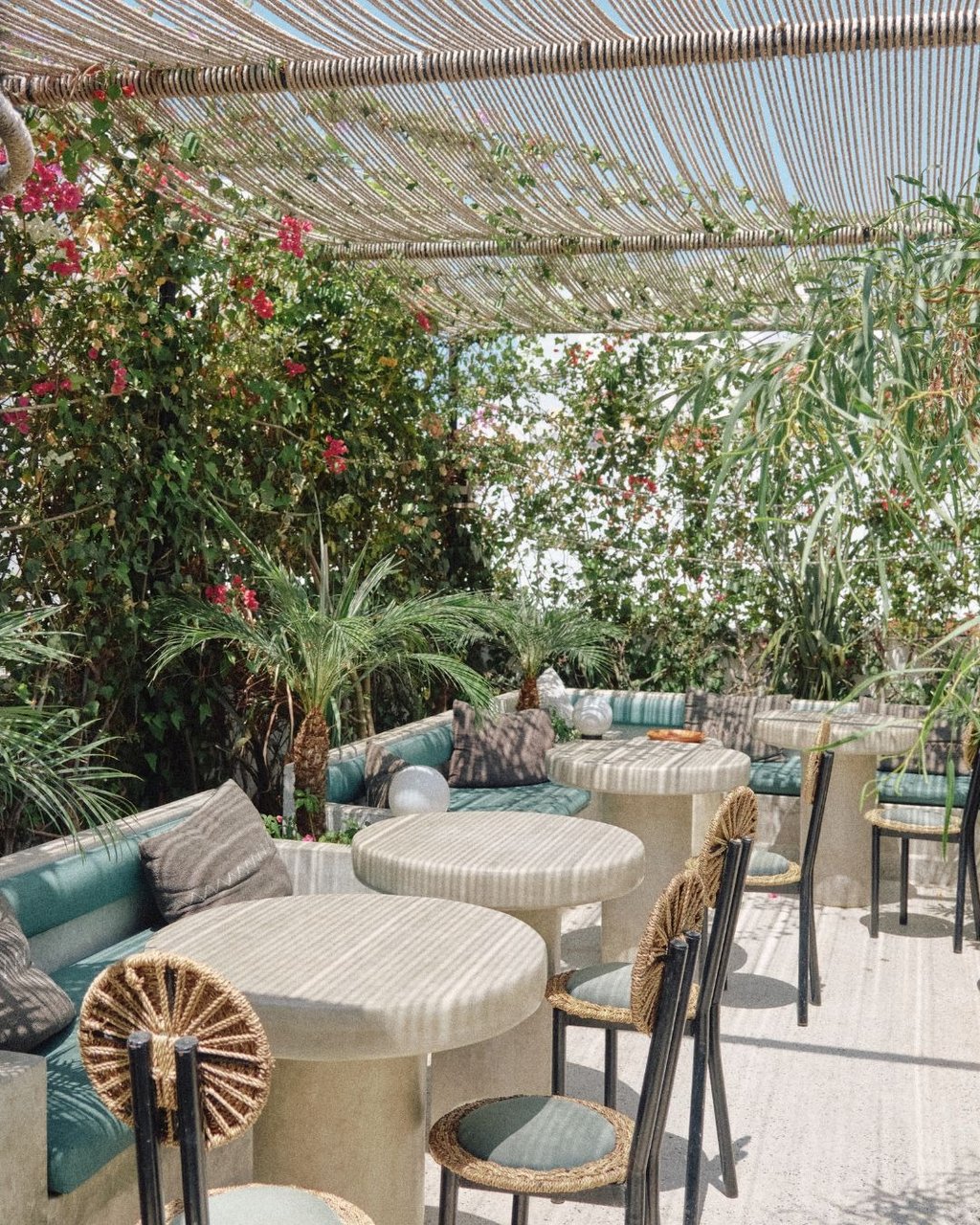

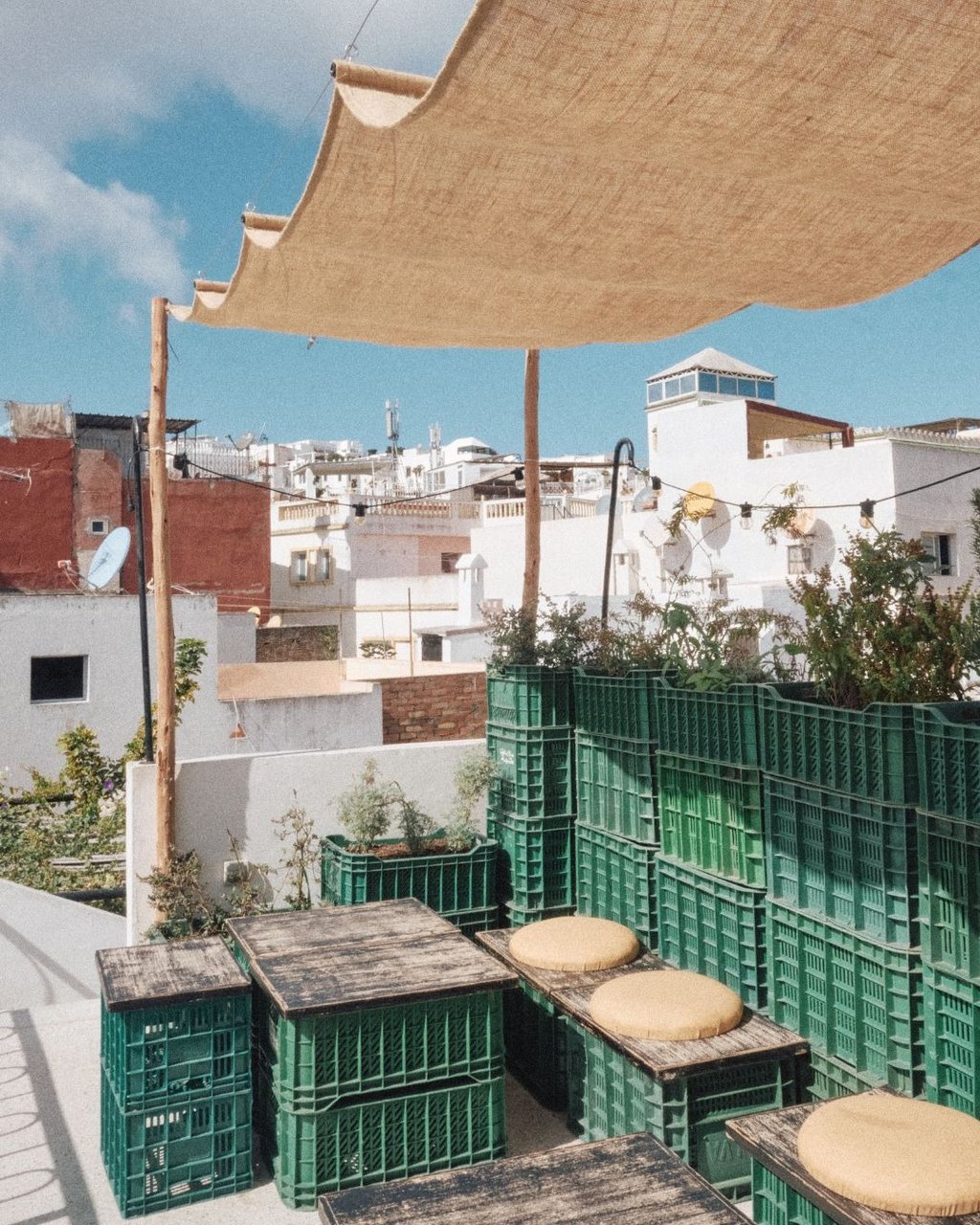

Rooftop Garden
A quiet and edible garden above the city, the rooftop is a growing ecosystem of mint, rosemary, basil, and edible flowers for tea. The rooftop serves both the kitchen and the community as a place to breathe, read, and reconnect with nature in Tangier.
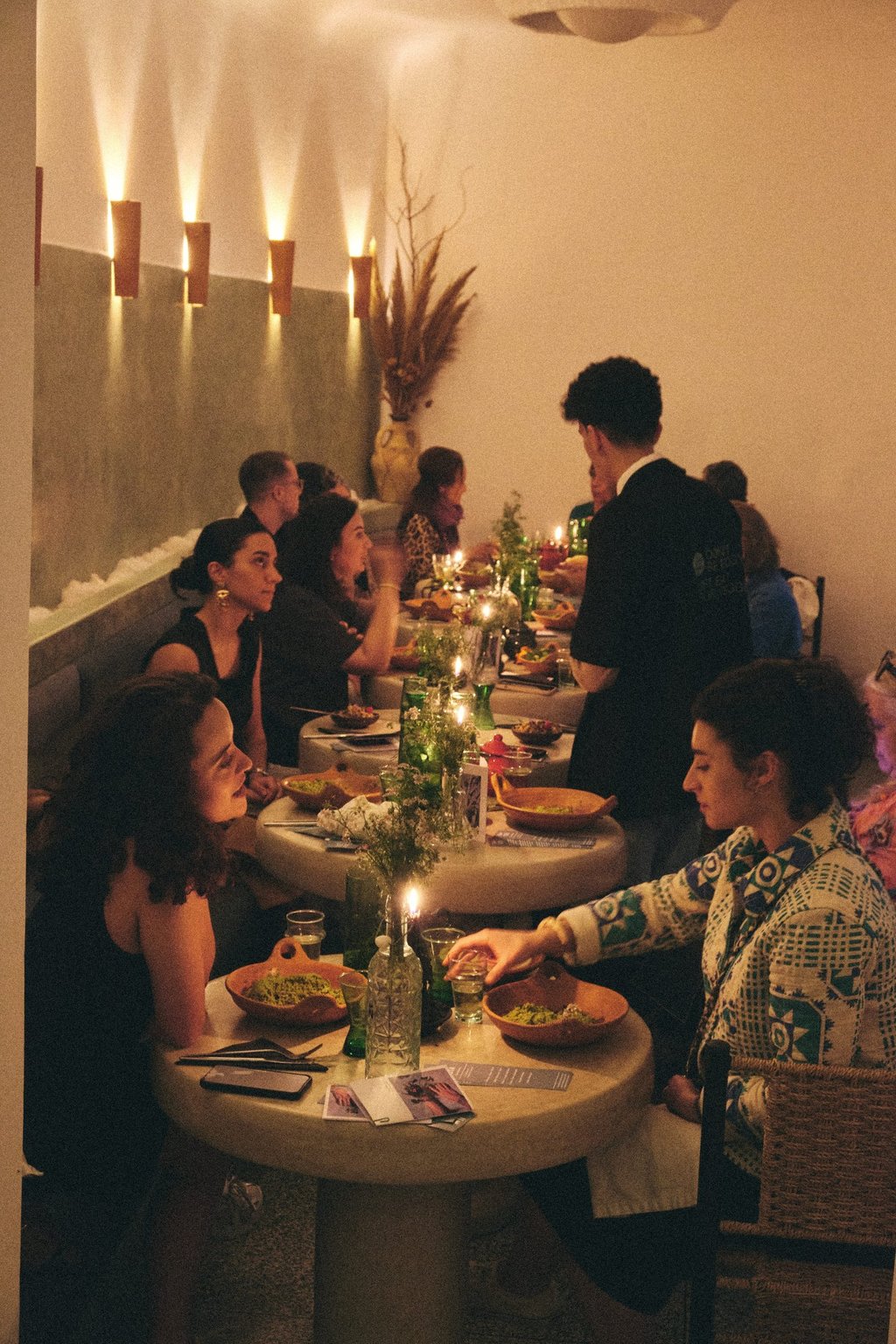

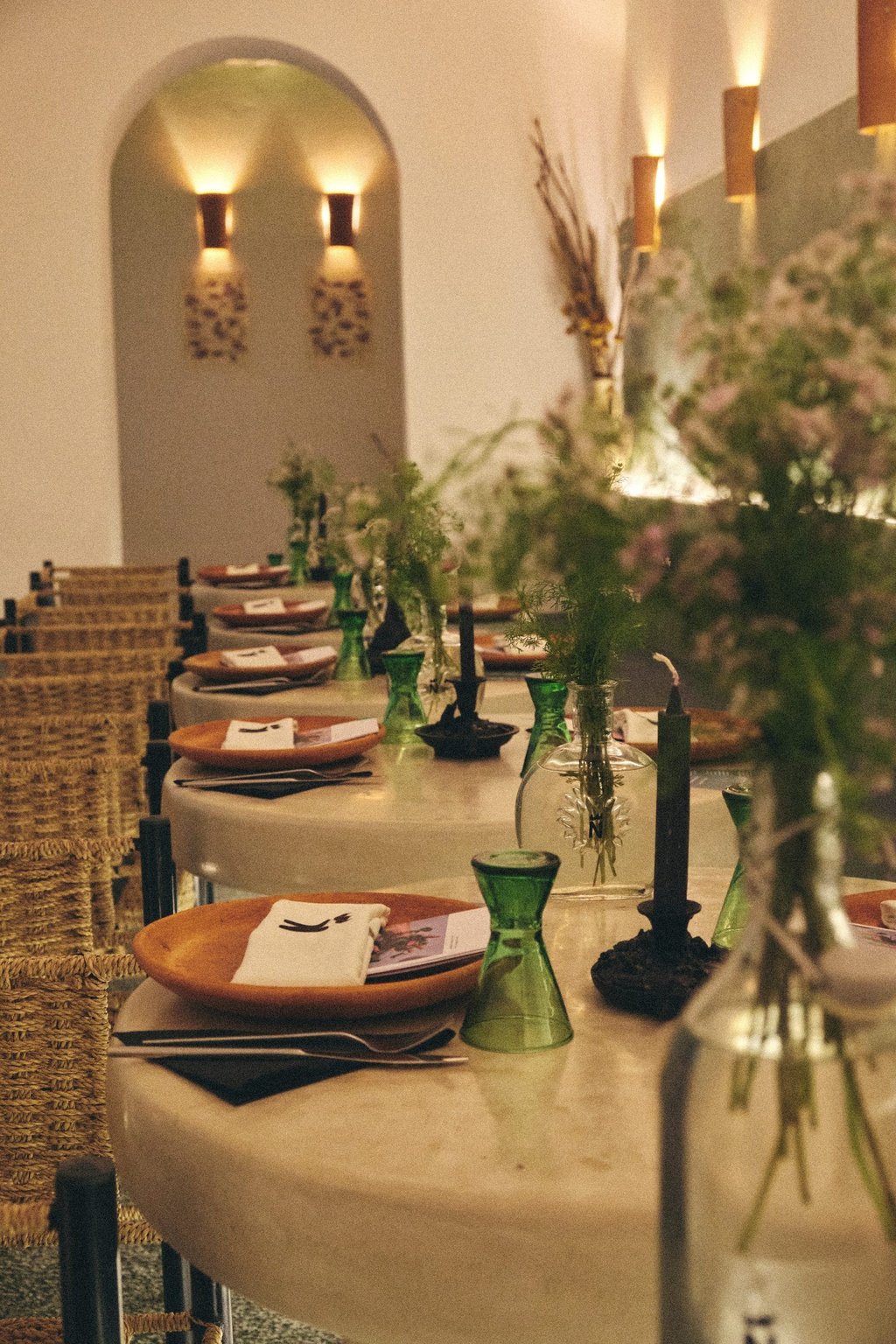



Workshops & Community Learning
NBTA hosts hands-on workshops that invite visitors to learn, experiment, and reconnect with the natural world. With each gathering, it opens a space for shared knowledge, creative exploration, and slow, mindful engagement.




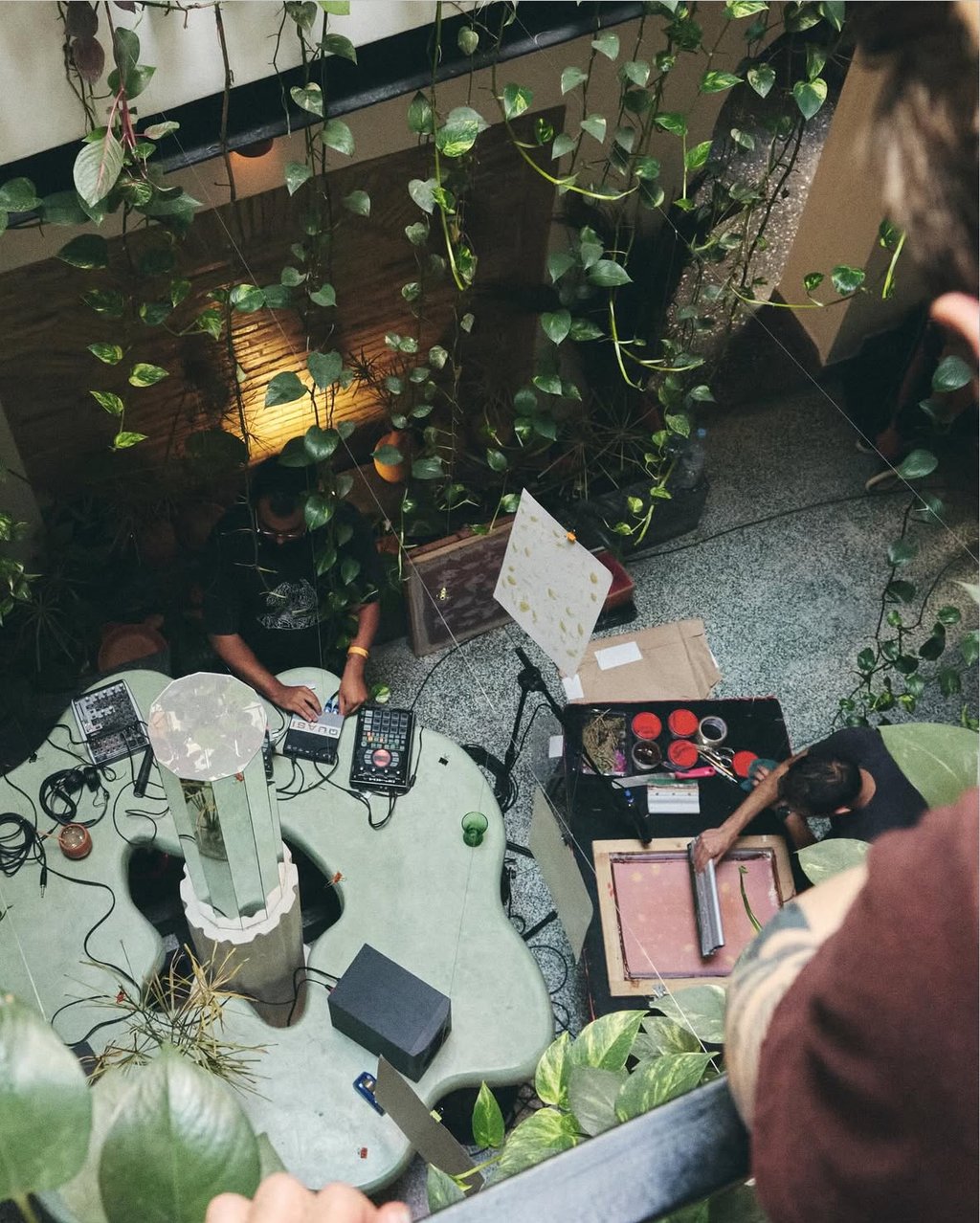

Art, Music & Food Residencies
NBTA is a living cultural hub where art, music, and food converge in a rhythm that is always evolving.
Their most recent workshop, held during La Semaine de la Permaculture, in collaboration with Bernard Alonso, offered participants an inside look at how NBTA brought life to its edible rooftop garden. Artists, travellers, and locals come together in these moments, cooking, creating, exchanging ideas, and slowing down within a community shaped by curiosity and care.
The house curates exhibitions and artistic collaborations that transform its rooms, corridors, and hallways into active gallery spaces. Installations, prints, and experimental works by artists like Amine Oulmakki and Kimiā Collective live alongside the daily life of the house, turning NBTA into a place where art is not only viewed but also experienced.
Music is just as essential to the spirit of NBTA. Throughout the time, the house hosts intimate performances by musicians such as Funfun Funeral, Pearz Music, Smawlma, and most recently, Leon, filling the rooftop and courtyard with sound, connection, and the gentle wind of Tangier. These moments bring people together over the values NBTA cherishes most: creativity, nature, and the simple joy of sharing a thoughtful meal.
Food residencies further enrich this cultural exchange. Guest chefs are invited from all around the world to create seasonal, plant-based menus that explore new flavours and low-impact techniques, offering visitors an experience where gastronomy becomes another form of art. At NBTA, culture is lived, shared, and invited to grow.
Credits: Images © NBTA.
